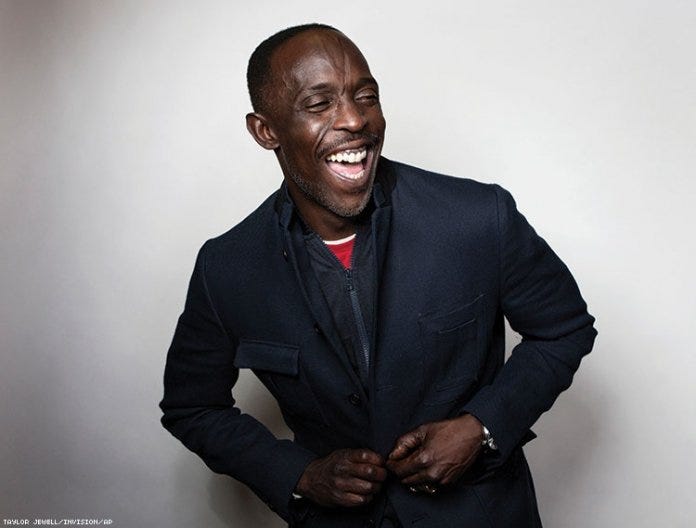*Note to The Vestibule’s subscribers: I penned this tribute to the late-great Michael K. Williams only a day or two after his 6 September 2021 death, mostly as a way to work through my shock and sadness at his passing.
Williams was one of America’s greatest actors, indeed one of the nation’s greatest artists, so his sudden demise made me think hard not only about what he meant to me personally but also to us, the American people, to say nothing of the world’s citizens, so famous had Williams become thanks to his breakout role as Omar Little in David Simon’s superb HBO drama The Wire (2002-2008).
Tough as it may be to accept, The Wire celebrated its 20th anniversary on 2 June 2022, making me think anew about Michael K. Williams’s contributions to national and international audiences, to acting, and to art.
As such, I publish this remembrance today, 6 June 2022, nine months after his passing and four days after the 20th anniversary The Wire’s inaugural broadcast, to commemorate the life of an American national treasure, who left us far, far too soon.
—All the best, Jason

1. Farewell, MKW
While driving through the streets of Maplewood, Missouri on 6 September 2021, I was shocked when Audie Cornish (co-host of National Public Radio’s All Things Considered) and Eric Deggans (NPR’s chief television critic) announced, just before 6pm, that Michael K. Williams had been found dead in his New York City apartment.1
“No!” I yelled at the radio. “No, it can’t be!”
This immediate response, I would learn in the hours and days to come, spoke for nearly every person I know who, like me, has long admired Williams’s film and television acting, to say nothing of his public commitment to social justice.
As difficult as it may be to believe, 20 years have passed since Williams first came to prominence by playing Omar Little in David Simon’s HBO masterpiece The Wire (2002-2008). Even more shattering is the knowledge that Williams didn’t survive to celebrate this program’s 20th anniversary or, just as bad, bask in the happiness generated by his Emmy nomination for playing Montrose Freeman in Misha Green’s wily adaptation of Matt Ruff’s novel Lovecraft Country (again for HBO).2
Indeed, calling Michael K. Williams “Mr. HBO” seems reasonable enough considering how frequently he appeared in prestige dramas produced by America’s best-known premium cable channel. Whether as Omar in The Wire, Montrose in Lovecraft Country, Freddy Knight in Richard Price & Steve Zaillian’s The Night Of (2016), or Chalky White in Terence Winter’s Boardwalk Empire (2010-2014), Williams rescued, almost singlehandedly, HBO’s vaunted original programming from what can charitably be called its inception as “whitebread” entertainment, especially after Darren Star’s Sex and the City (1998-2004) and David Chase’s The Sopranos (1999-2007) muscled Tom Fontana’s Oz (1997-2003)—HBO’s first original series, a prison drama more diverse in cast and crew than anything else made during the network’s earliest forays into scripted television—out of the cultural spotlight.

Williams is, or, rather, was (see how difficult it remains to believe that he’s passed?) not merely among the greatest American actors of his generation, but also a formidable presence wherever he went. This description should not suggest that MKW—as he’s affectionately known by his online fans—was fearsome in real life, although he played fearsome better than just about anybody else. Williams the actor was a master of understatement, of the wordless stare and the silent sneer and the quiet grin that communicates more than any line of dialogue possibly could.
“Oh indeed,” as Omar might say, Williams was terrific in every role he ever essayed. MKW was undoubtedly a strong personality both on and off screen, so it’s a fitting—if incomplete—epitaph to observe that Williams’s talent, commitment to his craft, and capacity for hard work transformed him into one of the most intelligent, honest, and empathetic artists working in any medium anywhere.

2. Actor, Actor!
That is high, but fully deserved, praise. No one who watches The Wire will ever forget Omar Little, the gay Baltimore stick-up man who robs drug dealers but refuses to hassle honest citizens, who ensures that his beloved grandmother gets to church each and every Sunday morning, and who strikes fear into his victims’ hearts by whistling “Farmer in the Dell” while carrying a loaded shotgun at his side.
The sight of Omar walking down West Baltimore’s streets wearing a leather duster, gun in hand and ready for all comers, causes people to yell, scream, or blurt “Omar’s comin’!” before they flee in terror because, yes indeed, Omar Little as played by Michael K. Williams is / was trouble. Big trouble, although Williams was not a particularly large man. Bad trouble, although Williams was never stereotypically histrionic or gruff. And, of course, terrific trouble, since Williams was, is, and always shall be fabulous in every scene, appearance, conversation, and showdown that The Wire offers him.
So indelibly linked to Williams were those words of warning that, when MKW appeared on the set of Spike Lee’s 2008 World War II drama Miracle at St. Anna for his first day of shooting, the impish Lee—a huge Wire fan whose movies (especially 1995’s Clockers) provide explicit inspiration for this series—screamed “Omar’s comin!’” to the assembled cast and crew. Williams, whom Lee had cast against type as a nervous soldier whose anxiety before battle departs markedly from Omar’s resolute approach to life, took this ribbing in the same good stride he did whenever people said those words to him—sometimes screaming them at him—on the street (no matter how irritating that little ritual must’ve become).
Yes, Michael K. Williams was a mensch. You’ll never hear stories about him being publicly rude to anyone (and you’ll never track down even one such anecdote) because, as far as I can tell, he was as fun, kind, and decent a person as we would all hope, which only confirms what his family, friends, and colleagues have said about Williams since he joined the ancestors. He was as good a person as he was an actor, which means he was a very good person indeed.
Yet, if you don’t trust my judgment about Williams’s acting talent, please consider taking the word of one of America’s best writers, the novelist and cultural critic Francine Prose.
Upon receiving Washington University in St. Louis’s International Humanities Medal in 2010 (bestowed by Wash U’s Center for the Humanities), Prose gave a stirring address titled “Ten Things Art Can Do for Us” in which she states, simply and memorably, “Art can be beautiful”3 before citing, in order, Hieronymus Bosch’s sixteenth-century triptych The Garden of Earthly Delights, Paul Cézanne’s 1893-1894 painting Still Life with Apples, Mavis Gallant’s 1963 short story “The Ice Wagon Going Down the Street,” Dezső Kosztolányi’s 1924 novel Skylark, Mike Leigh’s 1990 film Life Is Sweet, Francis Ford Coppola’s 1972 film The Godfather, and “every moment of Michael K. Williams’s portrait of Omar Little in David Simon’s The Wire” as proof that, in addition to beauty, “Art can give us pleasure.”4
What can we say to this pronouncement? Only “yes indeed.”

Williams’s work in every role he played was both beautiful and pleasurable, as well as something equally valuable: insightful. He unveiled each character’s inner state so precisely that you’ll never mistake Omar Little for Montrose Freeman or Chalky White for Freddy Knight, just as you’ll never confuse Williams playing Bobby McCray (in Ava DuVernay’s exceptional 2019 Netflix docudrama When They See Us) with his performance as Leonard Pine (in Sundance TV’s 2016-2018 series Hap and Leonard, Nick Damici and Jim Mickle’s fun and funky adaptation of Joe R. Lansdale’s long-running novel-and-short-story series). Each man, in Williams’s hands and body and spirit, is memorable, singular, utterly distinct—in a word, unique.
How many actors can make this claim over the course of just two or three roles, much less an entire career? Too few, I would argue, but Michael K. Williams defied not only the odds but also the temptation to repeat himself. He never did, which is the best measure of his life’s work.

3. Artist, Artist!
For completists, I also recommend Williams’s VICE TV documentary series Black Market, which sees him (and various guest hosts) visiting illicit trading sites all over the world, along with his notable movie appearances in, among others, 2007’s Gone Baby Gone, 2013’s 12 Years a Slave, and 2019’s Motherless Brooklyn. The man has 109 Internet Movie Database (IMDb) acting credits to his name, so you can’t go wrong delving into his expansive and substantial onscreen life.
The year 2021 was a tough one for losing treasured cultural luminaries, far too many of them African American. The legendary Cicely Tyson passed in January 2021, the incomparable Paul Mooney left us in May 2021, Bob Moses and Gloria Richardson journeyed to the other side in July 2021, and now Michael K. Williams has shuffled off this mortal coil. That would be a terrible toll at any time, but it strikes even harder as the COVID-19 pandemic persists, meaning that, even more than usual, we need people of Williams’s caliber to help us through the gloom.

Such musings, however, are too downbeat for memorializing a person as vibrant, as admirable, and as energetic as Michael K. Williams. Although we must say farewell to this terrific artist and citizen, we needn’t say goodbye. He bequeaths us a body of work guaranteed to bring lasting pleasure. Although a tremendous actor has exited the stage, his art—just as beautiful as Francine Prose claims it to be—remains for us to enjoy, and, yes indeed, to relish.
Michael K. Williams left us much too soon, but he remains an unforgettable contributor to our national life and our cultural heritage.
May he rest in perfect peace.
NOTES
Eric Deggans, “Actor Michael K. Williams of The Wire Found Dead at Age 54,” National Public Radio, 6 September 2021, https://www.npr.org/2021/09/06/1034656397/actor-michael-k-williams-of-the-wire-found-dead-at-age-54.
Williams lost this award to Tobias Menzies (for his role as Prince Philip, Duke of Edinburgh in Peter Morgan’s The Crown).
Francine Prose, “Ten Things Art Can Do for Us,” Belles Lettres vol. 11, no. 2, 2011, pg. 5.
Prose, “Ten Things Art Can Do for Us,” pg. 6.






